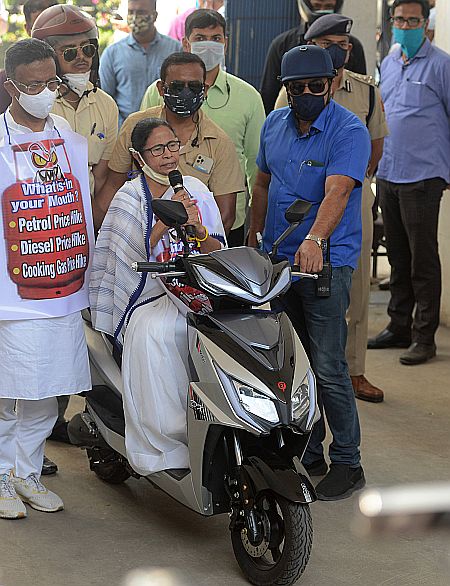Modi trying to impose 1 nation, 1 thought: Mamata
February 25, 2021 17:54

Mamata sits astride an electric scooter at Nabanna
Raising concerns regarding the Government of India's new guidelines for holding online/virtual international conferences and seminars for educational institutes and universities, West Bengal Chief Minister Mamata Banerjee on Thursday asked Prime Minister Narendra Modi whether the Centre is trying to impose "one nation, one thought".
In her letter to Prime Minister, Banerjee said, "Our universities must enjoy the highest possible degrees of self-governance and the freedom to conduct their educational activities in regular interactions with their counterpart abroad. Knowledge is neither created by nor belongs to any single country or community."
"Reasonable regulations and restrictions are understandable, however, the restrictions imposed vide the office memorandum under reference further highlighted the intention of the government of India towards centralization of the higher education system of our country. In other words, is it not the attempt of the central government to introduce thought policing in education institutions by trying to impose 'One Nation, One Thought'?" alleged the chief minister.
Banerjee asserted that the digital platforms have proved to be a boon for teachers and students from remote and rural areas as well as from cities to get the benefit of interactions with scholars around the world.
Referring to the Concurrent List of the Indian Constitution and sanctity of the federal structure, she said, "It will not be out of place to mention that education is in the Concurrent List of the Indian Constitution and any non-consultation by the Government of India with the state governments before issuing any such instructions to the educational institutions will be against the spirits of the federal structure enshrined in the Indian Constitution. Such communication will only be seen as an example of contempt for the constitutional power of the states."
"It may be pertinent to mention here that state governments are duly empowered under law to deal with any act committed by any educational institution, which violates any law or is contrary to the interest to the national security," added Banerjee.





 © 2024 Rediff.com -
© 2024 Rediff.com -